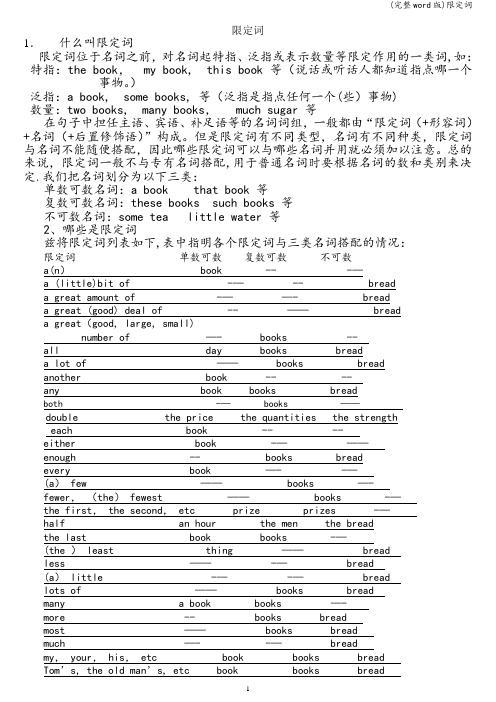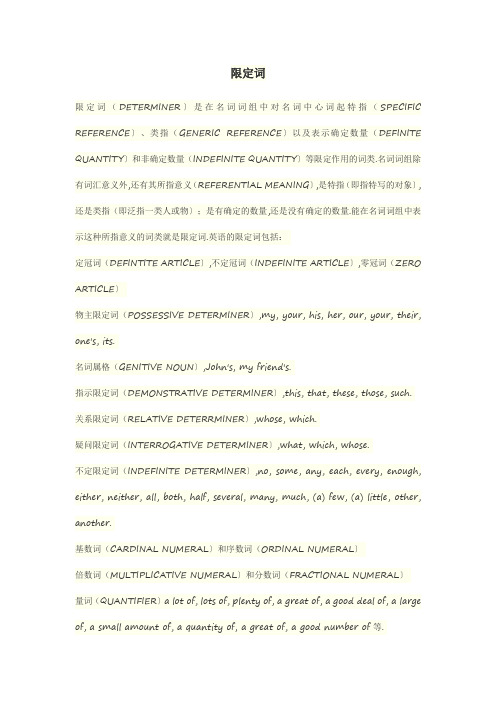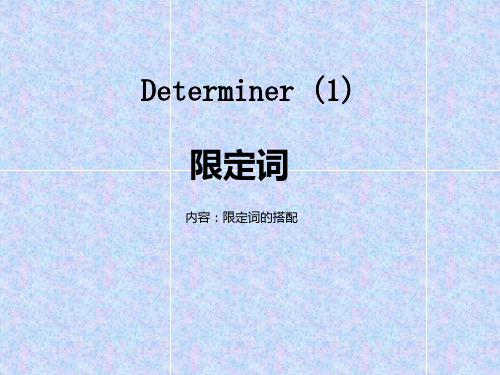限定词的分类与搭配关系1
(完整word版)限定词

限定词1.什么叫限定词限定词位于名词之前,对名词起特指、泛指或表示数量等限定作用的一类词,如:特指:the book, my book, this book 等(说话或听话人都知道指点哪一个事物。
)泛指:a book, some books, 等(泛指是指点任何一个(些)事物)数量:two books, many books, much sugar 等在句子中担任主语、宾语、补足语等的名词词组,一般都由“限定词(+形容词)+名词(+后置修饰语)”构成。
但是限定词有不同类型,名词有不同种类,限定词与名词不能随便搭配,因此哪些限定词可以与哪些名词并用就必须加以注意。
总的来说,限定词一般不与专有名词搭配,用于普通名词时要根据名词的数和类别来决定.我们把名词划分为以下三类:单数可数名词:a book that book 等复数可数名词:these books such books 等不可数名词:some tea little water 等2、哪些是限定词兹将限定词列表如下,表中指明各个限定词与三类名词搭配的情况:限定词单数可数复数可数不可数a(n) book -- -—a (little)bit of -— -- breada great amount of -——- breada great (good) deal of -- —— breada great(good, large, small)number of —- books --all day books breada lot of —— books breadanother book -- --any book books breadboth -— books ——double the price the quantities the strengtheach book -- --either book -———enough -- books breadevery book —- -—(a) few —— books —-fewer,(the) fewest —— books -—the first, the second, etc prize prizes -—half an hour the men the breadthe last book books -—(the ) least thing —— breadless —— -— bread(a) little -— -— breadlots of —— books breadmany a book books —-more -- books breadmost —— books breadmuch —- -— breadmy, your, his, etc book books breadTom’s, the old man’s, etc book books breadneither book -- --the next book books --no book books breadone book ———-one-third, two—fifths, etc (of)the book (of) the books the timeother student students breadthe other book books --plenty of —- books breadseveral -- books --some (某一)book books breadsuch book books breadthat book books breadthe book books breadthese -— books —-this book -— breadthose -- books ——twice, three times, etc the figure the quantities his strengthtwo, three, etc —- books --what(ever) book books breadwhich(ever) book books breadwhose book books breadzero(不用冠词或其它限定词) man men bread[注] 表内“-”表示有关限定词不能与该类名词搭配.限定词的搭配 1、概说名词词组中,当两个或两个以上的限定词同时出现时,限定词之间有一定的搭配关系,根据其不同的搭配位置可分为三类,其中最重要的一类是中位限定词,:Write your answer on every other line。
英语中的限定词

限定词限定词(DETERMINER〕是在名词词组中对名词中心词起特指(SPECIFIC REFERENCE〕、类指(GENERIC REFERENCE〕以及表示确定数量(DEFINITE QUANTITY〕和非确定数量(INDEFINITE QUANTITY〕等限定作用的词类.名词词组除有词汇意义外,还有其所指意义(REFERENTIAL MEANING〕,是特指(即指特写的对象〕,还是类指(即泛指一类人或物〕;是有确定的数量,还是没有确定的数量.能在名词词组中表示这种所指意义的词类就是限定词.英语的限定词包括:定冠词(DEFINTITE ARTICLE〕,不定冠词(INDEFINITE ARTICLE〕,零冠词(ZERO ARTICLE〕物主限定词(POSSESSIVE DETERMINER〕,my, your, his, her, our, your, their, one's, its.名词属格(GENITIVE NOUN〕,John's, my friend's.指示限定词(DEMONSTRATIVE DETERMINER〕,this, that, these, those, such.关系限定词(RELATIVE DETERRMINER〕,whose, which.疑问限定词(INTERROGATIVE DETERMINER〕,what, which, whose.不定限定词(INDEFINITE DETERMINER〕,no, some, any, each, every, enough, either, neither, all, both, half, several, many, much, (a) few, (a) little, other, another.基数词(CARDINAL NUMERAL〕和序数词(ORDINAL NUMERAL〕倍数词(MULTIPLICATIVE NUMERAL〕和分数词(FRACTIONAL NUMERAL〕量词(QUANTIFIER〕a lot of, lots of, plenty of, a great of, a good deal of, a large of, a small amount of, a quantity of, a great of, a good number of等.限定词与名词词组中心词之间有着某种固定的搭配关系;如果名词之前带有两个或两个以上的限定词,则限定词与限定词之间也有某种固定的搭配关系.本讲主要解决这两种搭配关系问题.1 限定词与三类名词的搭配关系限定词的选择决定于随后的名词的类别,是单数名词、复数名词,还是不可数名词.1〕能与三类名词搭配的限定词有些限定词如the, some, any, no, other, whose以及my, your等物主限定词和名词属格(John's, my friend's〕等能与三类名词搭配.例如:the book, my book, my friend's book, John's book, any book, some book, no book, the other book, whose book, the books,my books, my friend's book, John's books, any books, some books, no books, the other books, whose books, the money, my money, my friend's money, John's money, any money,some money, no money, the other money, whose money.2〕只能与单数名词搭配的限定词有些限定词如a(n), one, another, each, every, either, neither, many a, such a 等只能与单数名词搭配.例如:each worker, either book, an apple, another book, such a book, every student, neither sentence, one copy, many a book.3) 只能与复数名词搭配的限定词有些限定词如both, two, three, another two / three, many, (a) few, several, these, those, a (great) number of等只能与复数名词搭配.例如:both workers, several students, a number of essays, many students, (a) few words, these / those books, two / three visitors, another two / three students.4) 只能与不可数名词搭配的限定词有些限定词如a (little) bit of, a great amount of, a great deal of, (a) little, much 等只能与不可数名词搭配.例如:a bit of water, a great amount of labour, a great deal of work, (a) little space, much noise.5〕能与单、复数名词搭配的限定词有些限定词如the first, the second, the last, the next等既可与单数名词搭配,也可与复数名词搭配.例如:the first rose, the last man, the next meeting, the first roses, the last men, the next meetings.6〕能与单数名词和不可数名词搭配的限定词有些限定词如this, that, (the) least等能与单数名词和不可数名词搭配.例如:(the) least sign (of prejudice), this / that job, (the) least knowledge, this / that work.7〕能与复数名词和不可数名词搭配的限定词还有些限定词如a lot of, lots of, enough, more, most, such, other等可与复数名词和不可数名词搭配.例如:a lot of books, a lot of money, lots of chickens, lots of food, plenty of chairs, plenty of water, enough copies, enough coal, more articles, more time, most people, most work, such men, such bread, other men, other bread.不定量限定词less原先只与不可数名词搭配,但在现代英语中,less既可与不可数名词也可与复数名词搭配.例如:less money, less mistakes.2 限定词与限定词的搭配关系以上讲的是限定词与三类名词的搭配关系.除上述搭配关系外,限定词与限定词之间还存在着一定的搭配关系.在名词词组中心词之前如果有两个或两个以上限定词出现时,就会产生限定词的先后顺序问题.按其不同的搭配位置,限定词可分为:1〕中位、前位、后位限定词按照限定词与限定词之间不同搭配位置,限定词可分为中位限定词(CENTRAL DETERMINER〕、前位限定词(PREDETERMINER〕和后位限定词(POSTDETERMINER〕.a) 中位限定词包括a(n), the, zero; this, that, these, those; my, your, etc; Merry's, my friend's; some, any, no, every, each, either, neither, enough; what(ever), which(ever), whose等b) 前位限定词包括all, both, half; double, twice, three times, etc; one-third, two-fifths, etc; what, such, (a / an)等c) 后位限定词包括one, two, three, etc; first, second, third, etc; next, last, other, another, etc; many, much, (a) few, (a) little, fewer, (the) fewest, less, (the) least, more, most; several, plenty of, a lot of, lots of, a great / large / good number of, a great / good deal of, a large / small amount of; such等2) 三类限定词的搭配关系如果一个名词词组带有上述三类限定词,其搭配关系总是按照"前位--中位--后位"的顺序排列.例如:all前the中four后teachers.all前your中three后books.all前these中last后few后days.如果只有上述两类限定词,其搭配关系仍按上述顺序.例如:half前his中lecture.those中last后few后months.several后hundred后guests.all前other后students.such前a中misfortune.some中such后alloy.由上述诸例可以看出,中位限定词之间和前位限定词之间是互相排拆的,即一个名词中心词之前不可并用两个中位限定词或两个前位限定词.所以,"我的那本书"不是* my that book 而是that book of mine,因为my和that同是中位限定词,不可同时并列.但后位限定词的使用却不受此限.除上述those last few months, several hundred guests之外, this last two books, the first two chapters, three other girls, two more sheets, the next few weeks, many more copies, a few more samples, another twenty tons 等都是后位限定词重叠使用的实例.个别限定词有跨类现象,如such既属于前位限定词,又可归入后位限定词.由于它只是在such a...和such an...这样的搭配中属于前位限定词,而在与其他限定词(some, any, no, all, few, another, other, many, one, two, etc)搭配时,such则是后位限定词,一律放在上述这些限定词的后面,如some such, any such, nosuch, few such, one such等。
限定词(二):数量限定词与个体限定词

限定词(二):数量限定词与个体限定词 数量限定词(一):a few, few/al ittle, little数量限定词(二):some/any个体限定词(一):each/every与名词的搭配关系肯定/否定之别与only或very的搭配关系从与名词的搭配来看,a few和few的后面只能接复数名词,而a little和little的后面只能接不可数名词。
例如:a few days, few boys ; a little water, little money从肯定及否定的角度来看,a few和a little的意思是肯定的,相当于s ome,表示“有一些”的意思。
而few和little的意思是否定的,表示“很少,几乎没有”。
只能说:only a little或only a few,而不能说:only few*或o nly little*。
但为了强调否定意义,我们可说:very few或v ery little。
与名词的搭配关系特殊用法一:any与单数名词搭配特殊用法二:some与单数名词搭配从与名词的搭配来看,some和any均可以与不可数名词及可数名词复数连用,表示“一些”。
s ome一般用在肯定句中,而any一般用在否定句中。
在疑问句中,我们多数情况下用any,但是在表示我们期待一个正面的回答或要鼓励对方说“是”时,要在疑问句中用some。
例如:Havey ou got any medicine to cure your cough?你吃治疗咳嗽的药了吗? Would you like tog ive me some advice?你想给我提点建议吗?当any的后面接单数名词时,它的意思是“无论哪一个,任何一个”,此时可用于任何类型的句子。
You can catch any bus. They all go to the railway station.你坐哪辆公共汽车都行,它们都到火车站。
【外语学习记忆】法语限定词的分类及构词方法

J’ai plusieurs autres livres. 我还有其它好几本书。
法语限定词的构词方法:
◆定冠词:le, la, les
◆不定冠词:un, une, des
◆部分冠词:du,de la, de l', des
◆主有形容词:mon, ton, son, ma, ta, sa, mes, tes, ses,notre,votre, leur, nos, vos, leurs
◆指示形容词:ce, cet, cette, ces, ce…ci / là, cet…ci / là, cette…ci / là, ces…ci / là
◆泛指形容词:aucun(e), même(s),autre(s),quelque(s),quelconque(s),certain(e)(s), tel(le)(s), différent(e)s, divers(es), plusieurs, maint(e)(s), tout, tous, toute(s)
◆补充限定词:是指那些既可以单独使用,又可以相互组合或与其它任何限定词一起使用的限定词,它包括泛指形容词,基数词,序数词,感叹形容词,疑问形容词,例如:
Prends ces deux livres. 你拿这两本书。
Quels autres livres as-tu achetés ? 你还买了其它什么书?
Je n'aime pas les si, les mai.我不喜欢说话转弯抹角。
les pourquoi des enfants 孩子们的问题
◆现在分词或作形容语的现在分词
L'embétant est qu'il n'a pas appelé. 令人烦恼的是他没有打过电话。
限定词与限定词的关系

三类限定词的搭配关系
如果一个名词词组带有上述三类限定词,其搭配关系总是按照“前位—中位—后位” 的顺序排列。 all the four teacher all these last few days • 如果只有上述两类限定词,其搭配关系仍按上述顺序,例如: half his lecture those last few months several hundred guests 注意:(a)一个名词中心词之前不可并用两个中位限定词或两个前位限定词。 如:my that book(错) (b) such既属于前位限定词,又可归入后位限定词。由于它只是在such a…和such an…这样的搭配中属于前位限定词,而在与其他限定词( some, any, no, all, few, another, other, many, one, two 等)搭配时,such既是后位限定词,一律放在这些词 后面。 •
限定词与限定词的关系
做题人:C红尘
限定词的种类
一、根据限定词与限定词之间不同搭配位置,限定词可分为:中位限定 词、前位限定词、后位限定词。 (1)中位限定词包括: a , an , the, zero; this, that, these, those; my, your等; Mary ’ s, my friend’s; some, any, no, every, each, either, neither, enough; what , whatever, which, whichever, whose等。 (2)前位限定词包括: All, both, half ; double, twice, three times等;one—third, two—fifths 等;what, such (a/an)等。 (3)后位限定词包括: One, two等;first, second等;next, least, other, another等;many, much, (a) few, (a) little, fewer, (the) fewest, less, more, most, several, such等。此外还有plenty of, a lot of ,lots of, a great number of, a great deal of, a large amount of, a great quantity of等,其含义相当 于many/much,在理论上也应归入后位限定词。
详解限定词与名词的搭配

详解限定词与名词的搭配1.只能与单数名词搭配的限定词有些限定词只能与单数名词搭配,如a, an, one, another, each, neither, many a, such a等。
a toy an apple one bookanother student each worker neither girlsuch a sentence many a pencil(表示很多铅笔)2.只能与复数名词搭配的限定词有些限定词只能与复数名词搭配,如both, two, another two, many, a few, few, several, these, those, a number of等。
both toys two apples another two booksmany students a few workers few workersseveral girls these/those boys a number of pencils3.只能与不可数名词搭配的限定词有些限定词只能与不可数名词搭配,如a (little) bit of, a large amount of, a great deal of, (a) little, much, less, (the)least等。
a bit of food a large amount of moneya great deal of water much/ less space4.能与单、复数名词搭配的限定词有些限定词既能与单数名词搭配,又能与复数名词名词搭配,如the first ,the second , the last , the next 等。
the first student the next sentencethe first students the next sentences5.能与单数、不可数名词搭配的限定词有些限定词既能与单数名词搭配,又能与不可数名词名词搭配,如this, that等。
限定词资料

限定词限定词与名词的搭配关系1.能与三类名词搭配的限定词如the,some,any,no,other,whose以及my,your等物主限定词和名词属格等能与三类名词搭配。
the book the books the moneymy book my books my moneymy friend’s book my friend’s books my friend’s moneyJohn’s book John’s books John’s moneyany book any books any moneysome book some books some moneythe other book the other books the other moneywhose book whose books whose moneyNo student is to leave the classroom.No words can express my grief.I have no time to write to you.And whose side are you on ?你站在哪一边?2.只能和单数名词搭配的限定词a,an,another,each,every,either,neither,many a,such a等3.只能与复数名词搭配的限定词both,two,three,another two/three,many,(a)few,several,these,those,a(great)number of等4.只能与不可数名词搭配的限定词a (little)bit of,a large number of,a great deal of,(a)little,much,less,(the)least等5.能与单复数名词搭配的限定词the first,the second,the last,the next等the first man the first menthe last rose the last rosesthe next meeting the next meetings6.能与单数名词和不可数名词搭配的限定词this,that等this/that job this/that work7.能与复数和不可数名词搭配的限定词a lot of,lots of,plenty of,enough,more,most,such,othersuch men such bread限定词与限定词的搭配关系1前位,中位,后位限定词前位词:all,both,half;double,twice,three times等;one-third,two-fifths等;what,such (a/an)等中位词:a,an,the,zero;this,that,these,those;my,your等;Mary’s,my friend’s;some,any,no,every,each,either,enough;what(ever),which(ever),whose等后位词:one,two,three等;first,second,third等;next,last,other,another等;many,much,(a)few,(a)little,fewer,(the)fewest,less,(the)least,more,most;several,such等。
高中英语-限定词

Translate the following into English, using appropriate determiners: 1.开凿隧道需要大量劳动力(labor). 2. 少说空话(empty talk)多干实事(practical work)。 3. 今天参观展览会的人数比昨天少。 4. 安娜(Anna)因为没有足够的钱财而 烦恼丛生。
· There are few things I enjoy more than watching
fish swimming in the stream.
4.只能与不可数名词搭配的限定词
• 有些限定词如:a (little) bit of , a large amount of , a great deal of , (a) little , much less, (the) least等只能与 不可数名词搭配。例如: a bit of water a large amount of money much noise (a) little space less oil (the) least oil · There is little doubt that he and his accomplices are guilty. · The Square was the scene of much fighting in last year’s revolution. ·I can speak a bit of French and understand more .
6.能与单数名词和不可数名词搭配的限定词
有些限定词,如:this , that 等,能与单数名词和 不可数名词搭配。例如: this/that job this/that work · Whoever had come up with this idea deserved a medal. · My family have lived in that village for many generations. · I hope to enjoy that feeling again before long .
- 1、下载文档前请自行甄别文档内容的完整性,平台不提供额外的编辑、内容补充、找答案等附加服务。
- 2、"仅部分预览"的文档,不可在线预览部分如存在完整性等问题,可反馈申请退款(可完整预览的文档不适用该条件!)。
- 3、如文档侵犯您的权益,请联系客服反馈,我们会尽快为您处理(人工客服工作时间:9:00-18:30)。
限定词的分类与搭配关系
按照限定词与限定词的相互搭配关系,限定词可分为前位限定词, (pre-determiner)、中位限定词(central determiner)和后位限定词
(post-determiner)。
限定词的相互搭配关系为:前位+中位+后位
在这三类限定词中,前位限定词与前位限定词以及中位限定词与中位
限定词是相互排斥的,后位限定词与后位限定词之间虽不相互排斥但有搭
配限制。
限定词与限定词的搭配关系
除上述搭配关系外,限定词与限定词之间还存在着一定的搭配关系。
在名词词组中心词之前如果有两个或两个以上限定词出现时,就会产生限
定词的先后顺序问题。
按其不同的搭配位置,限定词可分为:
1〕中位、前位、后位限定词
按照限定词与限定词之间不同搭配位置,限定词可分为中位限定词(CENTRAL DETERMINER〕、前位限定词(PREDETERMINER〕和后位限定词(POSTDETERMINER〕。
a) 中位限定词包括a(n), the, zero; this, that, these, those; my, your, etc; Merry's, my friend's; some, any, no, every, each, either, neither, enough; what(ever), which(ever), whose等
b) 前位限定词包括all, both, half; double, twice, three times, etc; one-third, two-fifths, etc; what, such, (a / an)等
c) 后位限定词包括one, two, three, etc; first, second, third, etc; next, last, other, another, etc; many, much, (a) few, (a) little, fewer, (the) fewest, less, (the) least, more, most; several, plenty of, a lot of, lots of, a great / large / good number of, a great / good deal of, a large / small amount of; such等
2) 三类限定词的搭配关系
如果一个名词词组带有上述三类限定词,其搭配关系总是按照"前位--中位--后位"的顺序排列。
all前the中four后teachers.
all前your中three后books.
all前these中last后few后days.
如果只有上述两类限定词,其搭配关系仍按上述顺序
half前his中lecture.
those中last后few后months.
several后hundred后guests.
all前other后students.
such前a中misfortune.
some中such后alloy.
互相排斥
中位限定词之间和前位限定词之间是互相排斥的,即一个名词中心词之前不可并用两个中位限定词或两个前位限定词。
但后位限定词的使用却不受此限。
个别限定词有跨类现象,如such既属于前位限定词,又可归入后位限定词。
由于它只是在such a...和such an...这样的搭配中属于前位限定词,而在与其他限定词(some, any, no, all, few, another, other, many, one, two, etc)搭配时,such则是后位限定词,一律放在上述这些限定词的后面,如some such, any such, nosuch, few such, one such等,因此把它归入后位限定词。
